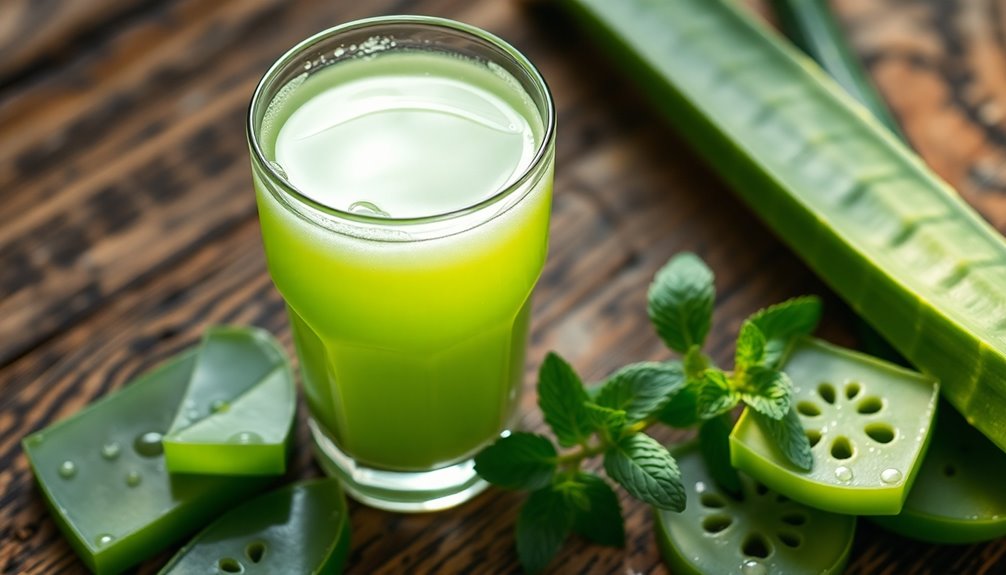Aloe vera juice has a unique taste that's slightly bitter with a gooey, gelatinous mouthfeel. You might find its thick texture off-putting, similar to jelly, and the bitterness can linger even with added sweetness. Although some brands mix aloe with fruit juices to improve flavor, the bitterness often remains. Your experience can vary significantly based on the brand and the number of servings. Curious about how others feel about it? There's more to discover!
Key Takeaways
- Aloe vera juice has a slightly bitter taste that can be prominent upon the first sip.
- The texture is gelatinous and thick, resembling jelly, which may be unappealing to some.
- Some brands attempt to mask bitterness with fruit juices, but the underlying flavor often persists.
- Multiple servings may intensify the bitterness and alter the overall taste experience.
- Consumer reactions to aloe vera juice are mixed, with some finding it unique and others feeling disappointed.

Have you ever wondered what aloe vera juice really tastes like? If you're considering giving it a try, you might want to prepare yourself for a rather unique flavor experience. Many people describe aloe vera juice as having a slightly bitter and gooey taste. This combination can be off-putting for some, especially if you're expecting something refreshing and pleasant.
When you first take a sip, you might notice that the bitterness hits you right away. It's not just the flavor that can be unappealing; the texture also plays a significant role. Aloe vera juice often has a gelatinous mouthfeel that some consumers struggle with. If you've ever tried eating a jelly-like substance, you can imagine what it's like. This thick consistency can create an unpleasant sensation on your palate, making it harder to enjoy the drink.
Some brands of aloe vera juice try to remedy this by blending the aloe with fruit juices. While that might sound like a clever solution, many users still find that the bitterness of the aloe comes through, no matter how much sweetness is added. Imagine sipping a drink that's supposed to be refreshing, only to be met with an underlying flavor that you didn't expect. That's the reality for many who venture into the world of aloe vera beverages.
If you're thinking about attempting multiple servings, you should know that the taste experience can become even more pronounced. With each sip, the bitterness can intensify, potentially making it more difficult to enjoy. What starts as a mild flavor might transition into a more robust experience that leaves you questioning your decision to try it in the first place.
Frequently Asked Questions
Does Aloe Vera Juice Taste Nice?
You might find that aloe vera juice doesn't taste nice. Many people describe its flavor as slightly bitter and gooey, which can be off-putting.
After a few servings, some say the taste intensifies, making it even less enjoyable. To make it more palatable, you can mix it with sweeteners or fruit juices.
Can You Drink Aloe Vera Juice Straight?
You can drink aloe vera juice straight, but it mightn't be the most pleasant experience.
Some people find its slightly bitter and gooey texture unappealing. If you’re not a fan of the taste, consider mixing it with other juices or sweeteners to improve it. Alternatively, adding it to smoothies can help disguise its unique taste while still providing the benefits. This adjustment may enhance your overall experience with the beverage and allow you to take advantage of its nutritional properties. Understanding the prune juice flavor profile can also help you explore other combinations that might suit your palate better.
What Does Aloe Vera Do to a Woman's Body?
Aloe vera's like a magical elixir for your body! It aids digestion, helping you feel lighter and more comfortable.
You'll notice your skin glowing with vitamins B, C, and E, giving you that youthful radiance.
Plus, it soothes menstrual discomfort, making those tough days a bit easier.
With its immune-boosting powers, you'll feel a shield against pesky infections.
Just remember, moderation is key to avoid any unwanted side effects!
What Happens if I Drink Aloe Vera Juice Every Day?
If you drink aloe vera juice every day, you might experience improved digestion and increased antioxidant intake.
Some people report a calming effect and relief from digestive issues. However, be cautious, as it can act as a diuretic, potentially leading to water weight loss and potassium depletion if consumed in excess.
Always check for added sugars in store-bought options, and consult a healthcare professional if you're considering high quantities.
Moderation is key!
Conclusion
In the world of flavors, aloe vera juice is like a refreshing oasis amidst a desert of sweetness. Its subtle, earthy taste might surprise you, but it carries a hint of bitterness that dances on your palate. This unique blend invites you to explore beyond the familiar, reminding you that health can come with an unexpected twist. So, take a sip and let this liquid gem rejuvenate not just your body, but your taste buds as well.
Cindy thoroughly researches juicing trends, techniques, and recipes to provide readers with practical advice and inspiration. Her writing style is accessible, engaging, and designed to make complex concepts easy to understand. Cindy’s dedication to promoting the advantages of juicing shines through her work, empowering readers to make positive changes in their lives through the simple act of juicing.










